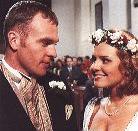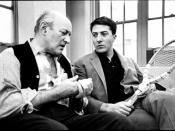Linda, in contrast, displays little of the boisterous intensity of Willy. Rather, she is dependable and kind, perpetually attempting to smooth out conflicts that Willy might encounter. Linda has a similar longing for an idealized past, but has learned to suppress her dreams and her dissatisfaction with her husband and sons. Miller indicates that she is a woman with deep regrets about her life; she must continually reconcile her husband with her sons, and support a man who has failed in his life's endeavor without any hope for pursuing whatever dreams she may have had. Linda exists only in the context of her family relationships as a mother to Biff and Happy and a husband to Willy, and must depend on them for whatever success she can grasp.
Miller focuses on during this segment of the play is that which it has on Linda. She has been the one to deal with Willy's erratic behavior alone, and doing so has made her age considerably.
She must be her husband's only defender, even when this threatens to further exacerbate the conflicts her family faces.
Miller deals with the indignities that Willy has suffered largely in terms of their effect on Linda. Since her existence and identity depend entirely on her husband, she staunchly defends him even when she realizes that he does not deserve the defense. When she tells Biff that he cannot love her if he does not love Willy, Linda essentially makes the choice of her husband over her children. She does this largely out of a strong feeling of duty toward Willy, for she knows that she is the only person who will show any concern for whether he lives or dies. Significantly, she centers her defense of Willy on his status as a human being and not...


